You may also be interested in
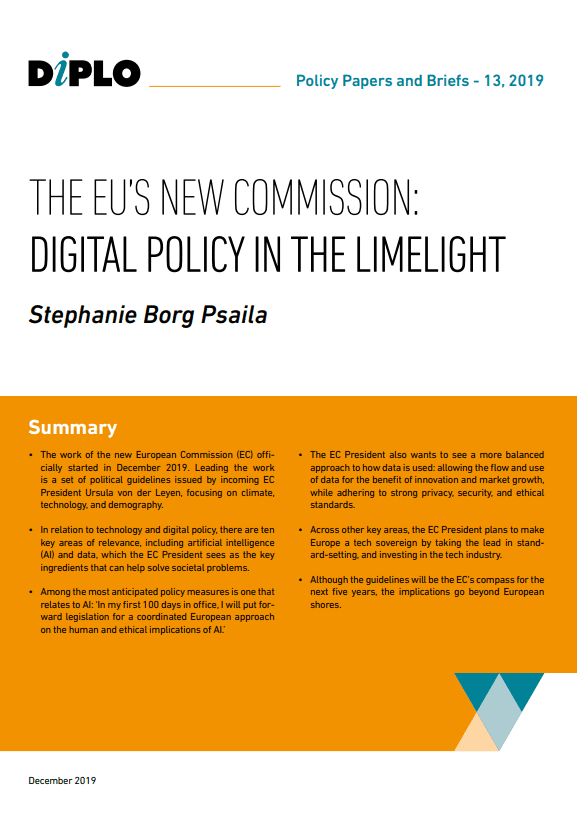
The EU’s New Commission: Digital Policy in the Limelight (Briefing Paper #13)
In this briefing paper, Dr Stephanie Borg Psaila analyses Ursula von der Leyen's new EU Commission's emphasis on digital policy for 2019–2024.

Adoption and adaptation of e-health systems for developing nations: The case of Botswana (Research by Benson Ncube)
This paper seeks appropriate solutions to improve the access and capability of the health delivery systems in Botswana. The research reveals that many countries are now using information-based services to assist in the administration and delivery of medical services via telecommunication infrastructures.
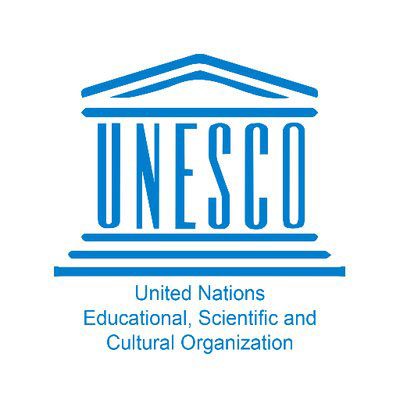
Education Counts: Towards the UN Development Goals
The text discusses the importance of education in achieving the UN Development Goals. It highlights the critical role education plays in economic growth, reducing poverty, improving health outcomes, and promoting gender equality. By investing in education, countries can address various societal challenges and work towards sustainable development.
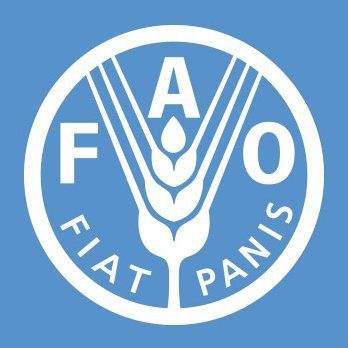
Special Ministerial Event on Food Security and Sustainble Development in Small Island Developing States
A summary of the Special Ministerial Event on Food Security and Sustainable Development in Small Island Developing States.

Global Public Goods: International Cooperation in the 21st Century
This collection of papers offers a new rationale and framework for international development cooperation. Its main argument is that in actual practice development cooperation has already moved beyond aid. In the name of aid (i.e., assistance to poor countries), we are today dealing with issues such as the ozone hole, global climate change, HIV, drug trafficking, and financial volatility. All of these issues are not really poverty related. Rather, they concern global housekeeping: ensuring an adequate provision of global public goods. Many important lessons could be drawn by first recognizing t...
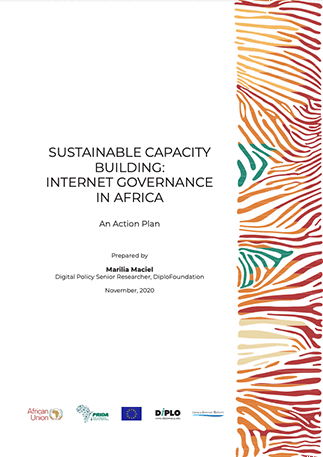
Sustainable Capacity Building: Internet Governance in Africa – An Action Plan
Enhancing sustainable capacity building on internet governance (IG) would have positive consequences within and beyond the African context. Considering the importance of the issues that fall under the framework of IG – ranging from providing access to infrastructure to promoting cybersecurity and fostering emerging technologies – it is possible to conclude that strengthening IG capacity building could ultimately contribute to developing the capacities required for implementing the Digital Transformation Strategy for Africa (2020-2030) (African Union, 2020a) and the Agenda 2063 (AU Commi...

Electronic government equals sustainable development for Guyana
Electronic government (e-government) equals sustainable development for Guyana. This is the thesis illustrated by this paper along with the possible constraints involved in implementing e-government.

The impact of development on a society
‘A critical activity will be information dissemination – educating people about IG issues and assisting them in formulating views and opinions that can not only be applied to their lives, but which can be communicated to national and regional leaders as appropriate.’ - Michele Marius from Jamaica
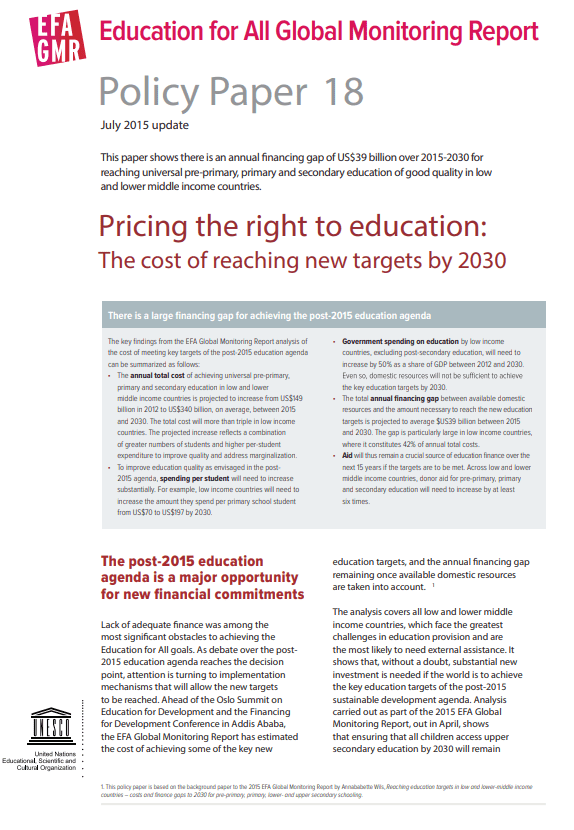
Pricing the right to education: The cost of reaching new targets by 2030
This paper shows there is an annual nancing gap of US$39 billion over 2015-2030 for reaching universal pre-primary, primary and secondary education of good quality in low and lower middle income countries.
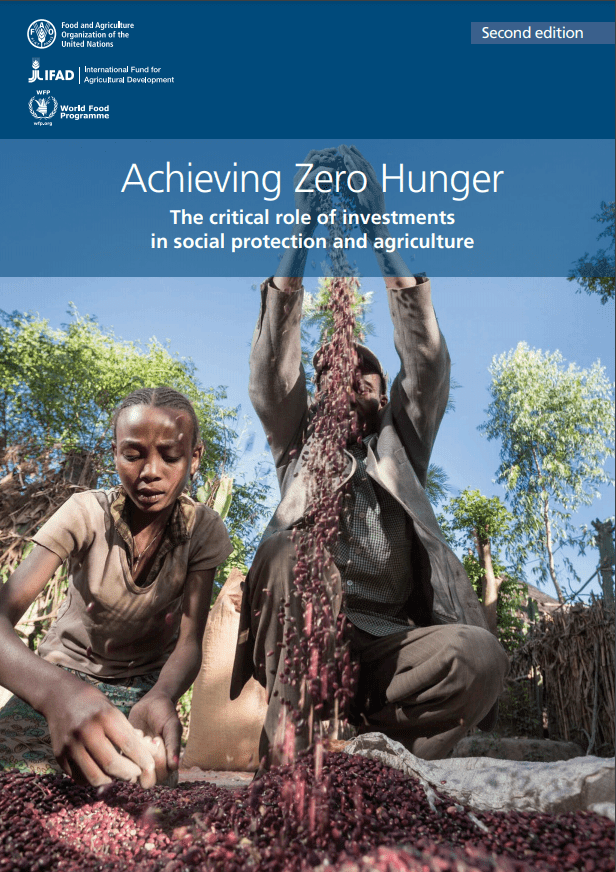
Achieving Zero Hunger: The Critical Role of Investments in Social Protection and Agriculture
The message emphasizes the crucial role of investments in social protection and agriculture in achieving zero hunger.
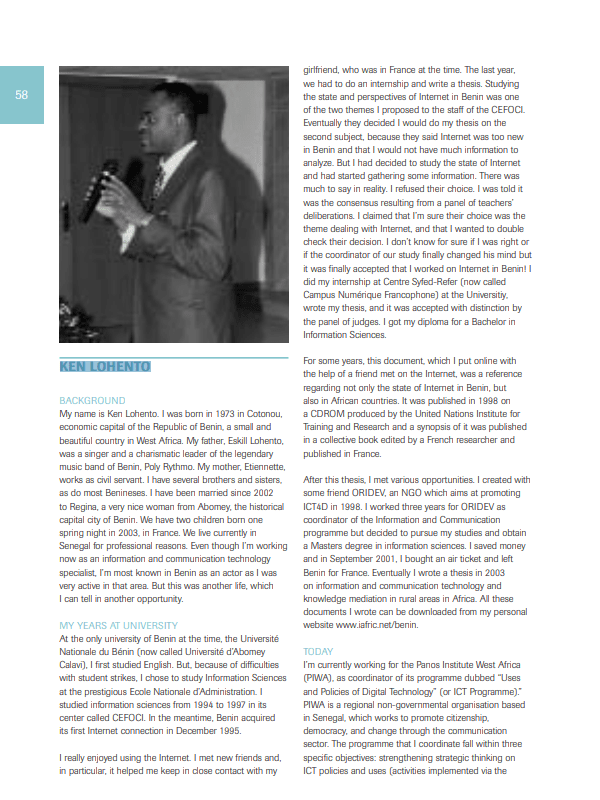
Facing challenges for developing countries
'Development challenges are enormous for Africa and they go beyond promoting information and communication technology. One important issue currently is how Africa will solve its energy problems, which are a threat to progress on the continent.' - Ken Lohento from Benin
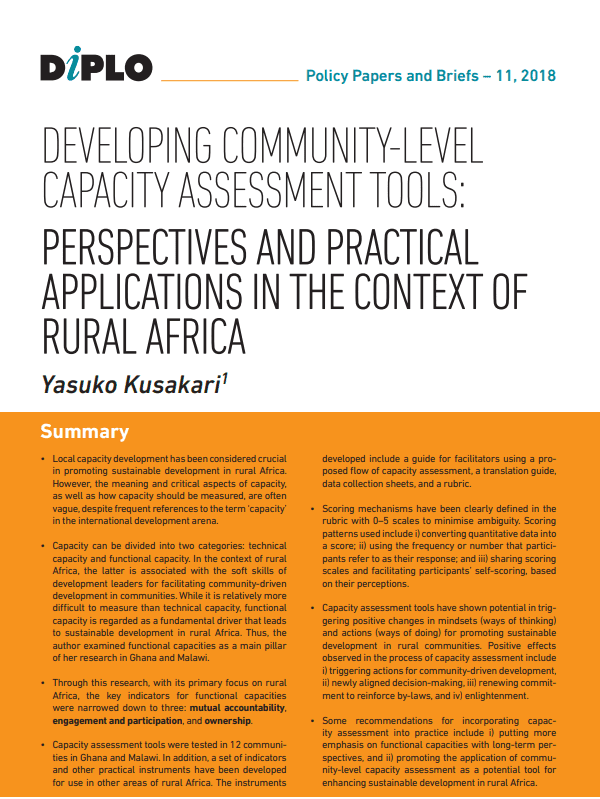
Developing Community-level Capacity Assessment Tools: Perspectives and Practical Applications in the Context of Rural Africa (Briefing Paper #11)
The message provides an overview of developing community-level capacity assessment tools relevant to rural Africa to improve local development strategies.

Development diplomacy and poverty reduction strategy
Lichia Yiu and Raymond Sanner describe in detail the application of development diplomacy in the context of international co-operation for poverty reduction in Highly Indebted Poor Countries. In particular, the authors describe the goal of the International Labour Organisation – a non-state actor – in advocating the inclusion of employment and Decent Work Agenda policies in Poverty Reduction Strategy Papers, an instrument developed by the International Monetary Fund and the World Bank.

Teaching computer literacy to alleviate poverty
'I am involved in strengthening education policies at a global level through a forum that will bring representatives from national and international organizations, experts, teachers, NGOs and the youth who are engaged in education...' - Charity Gamboa from the Philippines

In search of the most sustainable and coherent diplomatic approaches to addressing the fundamental challenges Small States (including Small Island States or SIDS) perennially face in an uncertain world of hegemonic giants
Small states, in every sphere of natural and human activity, are negatively and disproportionately impacted by crises, when compared to their hegemonic, larger and stronger counterparts.

The Feasibility of Information Communication Technology as a Tool for Development: Caribbean Community Perspectives
As a result of global trends relating to trade, many small economies continue to seek replacements for traditional markets which no longer offer preferential treatment.

Oslo Summit: Financing Education in Developing Countries
The Oslo Summit focuses on financing education in developing countries to ensure access and quality education for all children.

Bridging the digital divide
‘Internet governance (IG) is a new field which lacks expertise in Madagascar. Some of the pressing issues in Madagascar are the digital divide, IT illiteracy, and the inadequacy of national jurisdiction with technology advances.’ - Zoniaina Fitahiana Rakotomalala from Madagascar

The Role of Regional Cooperation in Eradicating Poverty and Aid Dependency in East Africa
The hypothesis of this thesis is that regional cooperation and integration are effective tools in alleviating poverty within nations and reducing their dependency on foreign or development aid.

Access of ICT benefits for underserved rural communities in developing countries: A case study from Nepal
Policy-makers and governments in developing nations can implement more effective policies and frameworks by gaining a better understanding of the factors that support stakeholders and partners to extend the benefits of information communication technology (ICT) to rural communities. The aim of this paper is to answer the framework to follow for extending access to ICT benefits in underserved rural areas of a developing country.
Understanding the Digital Divide
The digital divide refers to inequalities in access to and usage of technology. Factors such as income, education, geography, and age can contribute to this gap. Bridging this divide is crucial for ensuring equal opportunities for all individuals in today's technologically-driven world.

Enyclopedia of International Development
The Encyclopedia of International Development is a comprehensive resource that covers a wide range of topics related to development, including theories, practices, actors, and key issues. It offers insights from various disciplines and perspectives, making it an invaluable tool for researchers, policymakers, and practitioners in the field of international development.

Australian aid: Promoting prosperity, reducing poverty, enhancing stability
The text is about Australian aid focusing on promoting prosperity, reducing poverty, and enhancing stability.

Development Aid and Nigeria’s Poverty Challenge: Millenium Development Goals 4 and 5 in Focus
The quest to eradicate poverty has been identified as the most critical challenge facing development in the world today. Women and children are disproportionately affected by poverty.
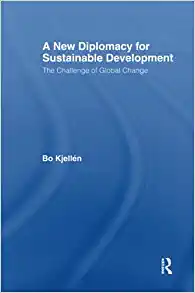
A New Diplomacy for Sustainable Development: The Challenge of Global Change
The text discusses the need for a new diplomacy approach to address the challenges of global change and foster sustainable development.

Information and communications technologies for development
The text discusses the role of information and communications technologies (ICTs) in development.
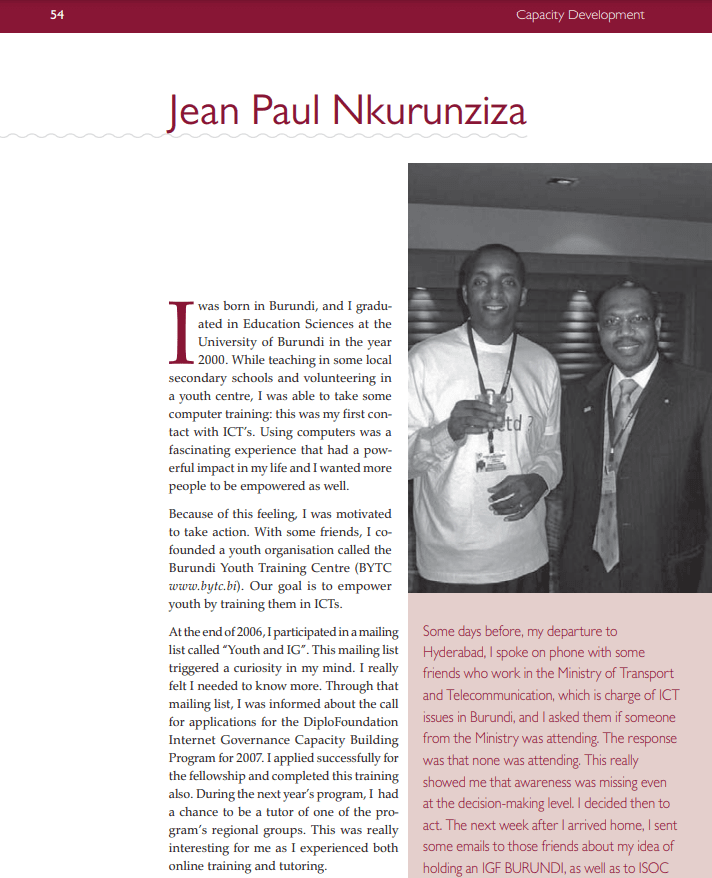
A developing country’s perspective on IG issues
'Among all the country members of the East African Community, only Burundi, my country, was absent from that EAIGF... That’s why, at the end of the IGF in Hyderabad, I came back with a new dream: An IGF Burundi.' - Jean Paul Nkurunziza from Burundi

Re-imagining the future
‘There is so much work still to be done. There are so many unraveling threads. There is so much still to create. There is much need to better use the Internet for development.’ - Sheba Mohammid from Trinidad and Tobago
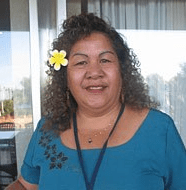
Developing ICT for youth and people in rural settings
'There is a huge need for online learning infrastructure at the national level in my country and I am sure it is the same in other small island developing states... I encourage governments to have their public servants, in particular youth to study Internet governance...' - Fuatai Purcell from Samoa

Empowering women in the IG process
'At the ICANN meeting in Puerto Rico last year I was not aware of anything unusual in the demographics, but in Hyderabad I noticed that while men of my age were quite well-represented, there were comparatively few women...' - Deirdre Williams from St Lucia
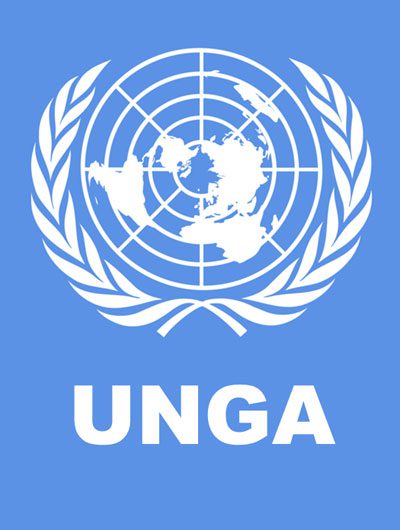
Transforming Our World: The 2030 Agenda for Sustainable Development
Transforming Our World: The 2030 Agenda for Sustainable Development is a comprehensive plan that outlines 17 goals aimed at ending poverty, protecting the planet, and ensuring prosperity for all. It addresses challenges such as climate change, inequality, and peace and justice. The agenda emphasizes the importance of partnerships, data, and financing in achieving these goals. Implementing the agenda requires a collective effort from governments, businesses, civil society, and individuals to create a more sustainable and equitable world by the year 2030.

Common African Position on the Post-2015 Development Agenda
The participatory approach that led to the elaboration of the Common African Position (CAP) on the post-2015 Development Agenda involving stakeholders at the national, regional and continental levels among the public and private sectors, parliamentarians, civil society organizations (CSOs), including women and youth associations, and academia. This approach has helped address the consultation gap in the initial preparation and formulation of the Millennium Development Goals (MDGs).
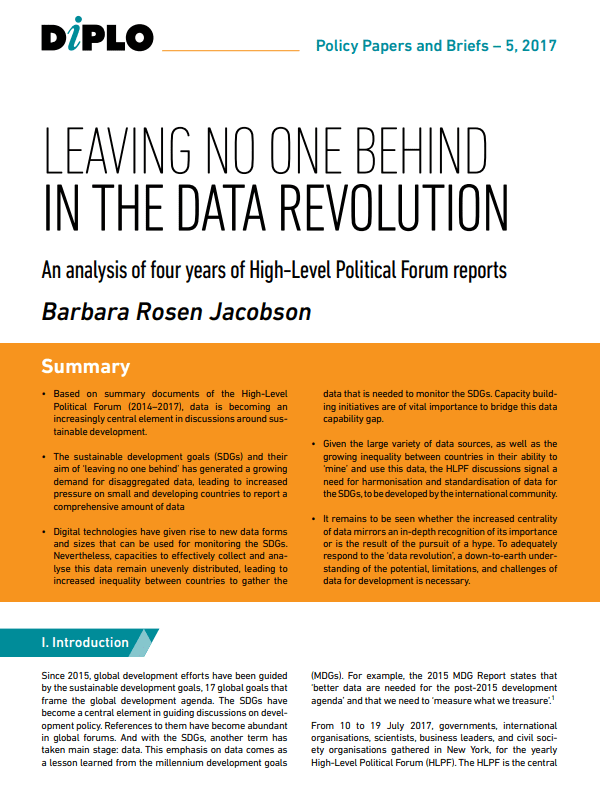
Leaving No One Behind in the Data Revolution (Briefing Paper #5)
The text offers policy recommendations and insights on cybersecurity, focusing on building resilience, fostering cooperation, and addressing challenges in the digital domain.
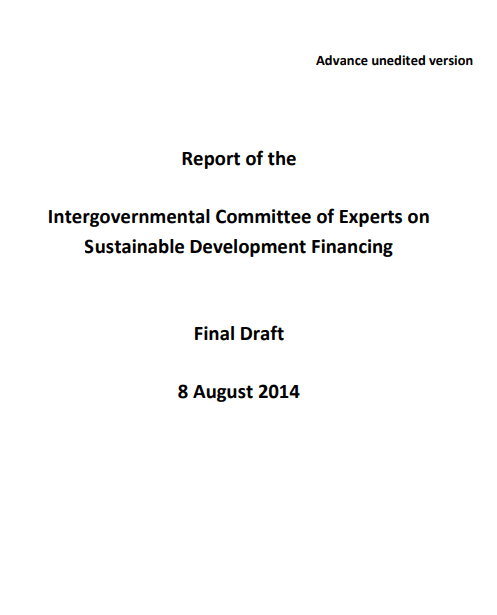
Report of the Intergovernmental Committee of Experts on Sustainable Development Financing
Report of the Intergovernmental Committee of Experts on Sustainable Development Financing.

Small states in the global politics of development
Much of the discussion surrounding small states has treated them as a discrete category, with common vulnerabilities and opportunities. However, a productive approach is to look at the global politics of development, and then see where small states fit in. The author looks in turn at the global politics of finance, trade and the environment. He concludes that small states have been largely unsuccessful in asserting their own interests in global politics, and that (to the extent that it is possible to generalize about states which differ greatly) vulnerabilities rather than opportunities are th...

Defining development in the context of current realities
‘My personal knowledge reflects other cultures and types of people in Fiji and the Pacific. I live not only with one race but with many who have different cultural and traditional values.’ - Anju Mangal from Fiji
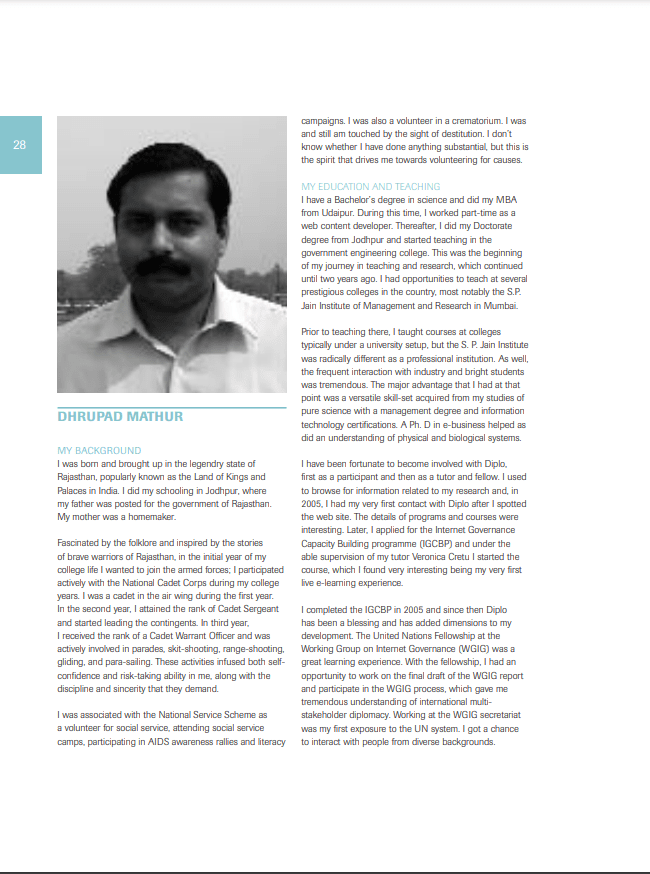
A sustainable project with great results
It is a sustainable project with great results. The participants of our capacity building projects are currently taking charge of managing local initiatives, drafting regional ICT policy plans and training their own teams.' - Dhrupad Mathur from India
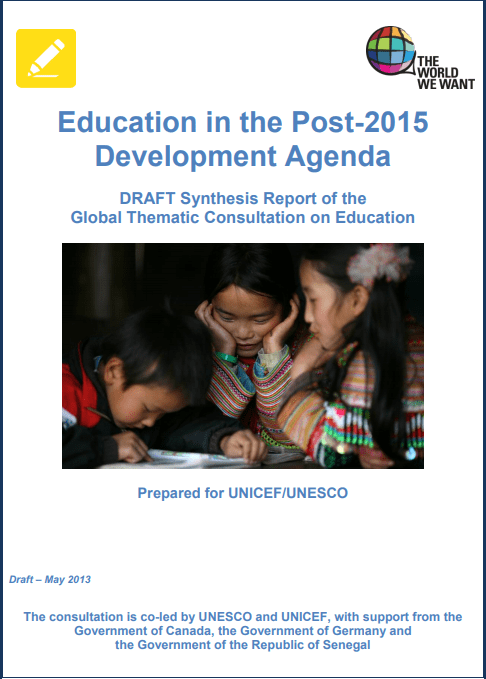
Making Education a Priority in the Post-2015 Development Agenda
The post-2015 development agenda should prioritize education to address global challenges effectively and promote sustainable development. Educational goals must encompass quality, inclusivity, equity, and lifelong learning opportunities for all individuals, regardless of background. Investing in education not only benefits individuals by improving their opportunities and well-being but also contributes to societal advancement by fostering economic growth, reducing poverty, and promoting social cohesion. Education is a fundamental human right and a key driver of progress, making it essential f...
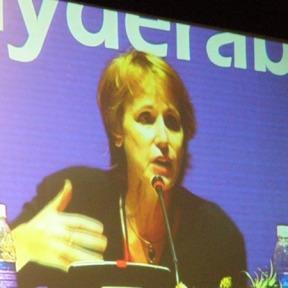
Towards ‘concrete, physical, and local’
'This is not an outside imposition of technology, but an enthusiastic acceptance of support... the ideal situation, where just a push, just a bit of help, can enable the local population to maximise use of resources under their own direction.' - Virginia Paque from Wisconsin, USA

The World Bank’s Contribution to Poverty Reduction in Peru
Peru’s economy has improved significantly, however poverty is an imperative issue that is not progressing as expected.
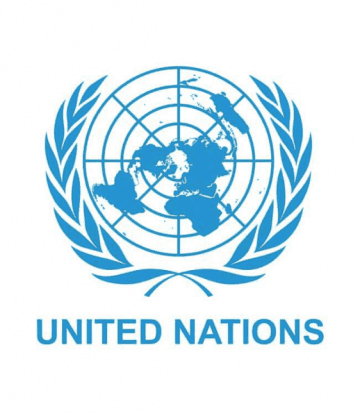
The Milennium Development Goals Report 2015
The Millennium Development Goals Report 2015 reflects on the progress made towards achieving the eight goals set by world leaders in 2000. It highlights significant accomplishments in areas such as poverty reduction, child mortality, and access to clean water. However, challenges remain, including disparities among regions and persistent inequalities. The report emphasizes the need for continued efforts to address these issues and accelerate progress towards sustainable development.

Digital Opportunities for All: Meeting the Challenge
The text is about embracing digital opportunities to overcome challenges and ensure access for all.

Breaks through the barriers of development
‘Capacity building is necessary to allow for equal participation... It will require all of us who have leadership positions to gain more knowledge to be able to provide, promote, and support Internet access for all.’ - Angelic Alihusain-del Castilho from Surinam

Development Effectiveness: What Have We Learnt?
The text discusses lessons learned regarding development effectiveness.
The Vulnerability of the Small Island Developing States of the Caribbean
The Small Island Developing States of the Caribbean are highly vulnerable to external economic and environmental shocks due to their small size and limited resources, which threaten their sustainability and development.
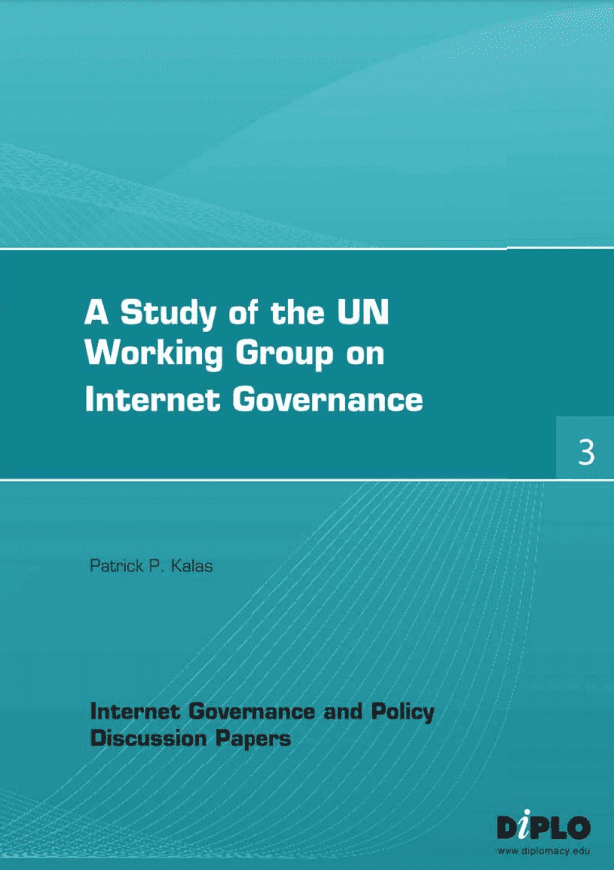
A study of the UN Working Group on IG – MSP in communication technology for development at the global level
The paper aims to identify best practices and lessons learned in multi-stakeholder partnership (MSP) practices at the global policy level through a participatory methodology based on interviews and an online electronic survey.

Exploring the need for speed in deploying information and communications technology for international development and bridging the digital divide
This paper comes on the eve of the millennium development goals deadline of 2015 which acknowledges ICT as the enabler for speeding towards the finish line. The quest is to explore whether we are all speeding towards a clearly defined goal, given our varied capacities and affinities.
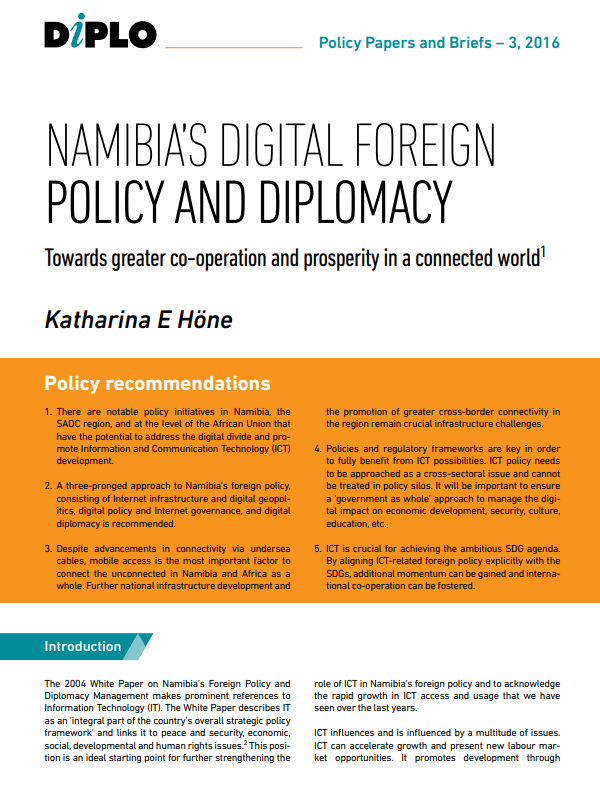
Namibia’s Digital Foreign Policy and Diplomacy (Briefing Paper #3)
This briefing paper emerged from Diplo's participation in Namibia's Foreign Policy Review Conference (July 2016). In this paper, Dr Katharina E. Höne suggests a three-pronged approach to Namibia's digital foreign policy and diplomacy, and looks at the discourse on information and communications technology (ICT) and development.

The road to dignity by 2030: ending poverty, transforming all lives and protecting the planet
The message emphasizes the goal of achieving dignity by 2030 through ending poverty, transforming lives, and preserving the environment.
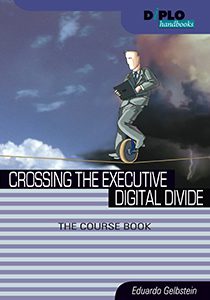
Crossing the Executive Digital Divide
Information and communications technologies (ICT) have become critical in business, government, manufacturing, critical infrastructures, academia, and, literally, everywhere else, and yet, despite the large sums of money involved, ICT remains the least well understood function in an organization.
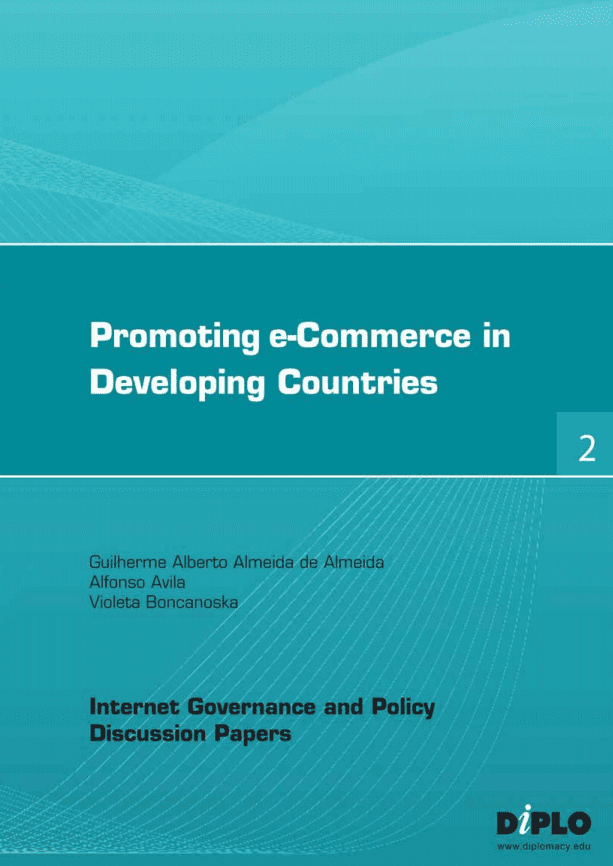
Promoting e-Commerce in developing countries
This study examines the advantages and possibilities for the use of digital signatures to carry out electronic transactions. It focuses on developing and transition countries that have not fully implemented the use of digital signatures in their economic, commercial and productive processes. An important aim of this research is to create awareness on the likely effects for enforcing the use of digital signatures to carry out e-commerce transactions on the economies of developing and transition countries. The study also proposes key issues to be considered for policy-makers in countries in orde...
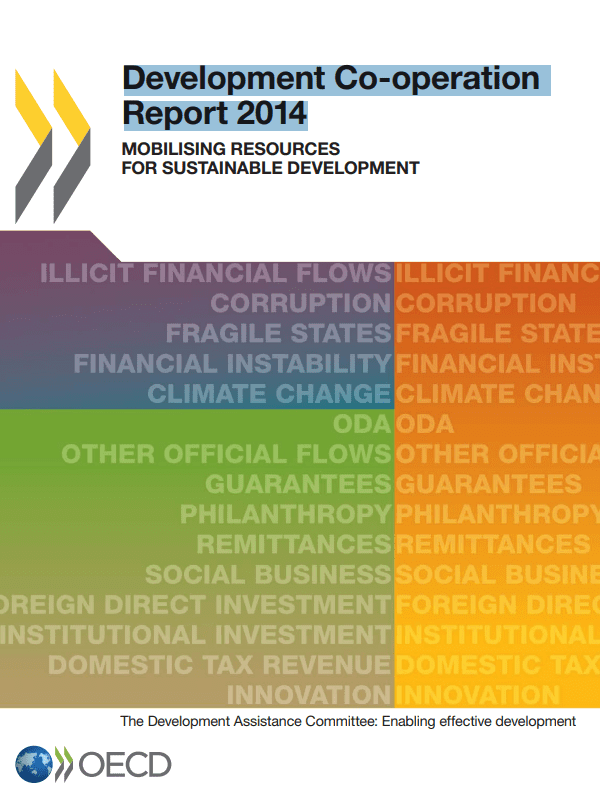
Development Co-operation Report 2014: Mobilising Resources for Sustainable Development
The Development Co-operation Report 2014 emphasizes the importance of mobilizing resources for sustainable development. It highlights the need for effective partnerships, innovative financing mechanisms, and increased transparency to achieve development goals. The report also stresses the importance of policy coherence, human rights-based approaches, and the engagement of a wide range of stakeholders in development efforts.
The latest from Diplo and GIP
Tailor your subscription to your interests, from updates on the dynamic world of digital diplomacy to the latest trends in AI.
Subscribe to more Diplo and Geneva Internet Platform newsletters!
Diplo: Effective and inclusive diplomacy
Diplo is a non-profit foundation established by the governments of Malta and Switzerland. Diplo works to increase the role of small and developing states, and to improve global governance and international policy development.


